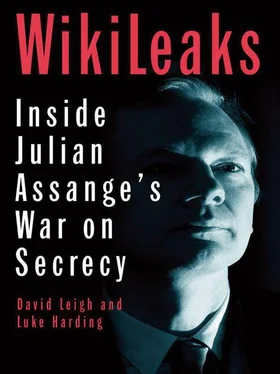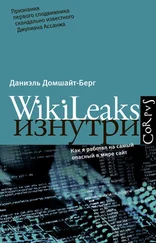Harding, Luke - WikiLeaks - Inside Julian Assange's War on Secrecy
Здесь есть возможность читать онлайн «Harding, Luke - WikiLeaks - Inside Julian Assange's War on Secrecy» весь текст электронной книги совершенно бесплатно (целиком полную версию без сокращений). В некоторых случаях можно слушать аудио, скачать через торрент в формате fb2 и присутствует краткое содержание. Жанр: Старинная литература, на английском языке. Описание произведения, (предисловие) а так же отзывы посетителей доступны на портале библиотеки ЛибКат.
- Название:WikiLeaks: Inside Julian Assange's War on Secrecy
- Автор:
- Жанр:
- Год:неизвестен
- ISBN:нет данных
- Рейтинг книги:3 / 5. Голосов: 1
-
Избранное:Добавить в избранное
- Отзывы:
-
Ваша оценка:
- 60
- 1
- 2
- 3
- 4
- 5
WikiLeaks: Inside Julian Assange's War on Secrecy: краткое содержание, описание и аннотация
Предлагаем к чтению аннотацию, описание, краткое содержание или предисловие (зависит от того, что написал сам автор книги «WikiLeaks: Inside Julian Assange's War on Secrecy»). Если вы не нашли необходимую информацию о книге — напишите в комментариях, мы постараемся отыскать её.
WikiLeaks: Inside Julian Assange's War on Secrecy — читать онлайн бесплатно полную книгу (весь текст) целиком
Ниже представлен текст книги, разбитый по страницам. Система сохранения места последней прочитанной страницы, позволяет с удобством читать онлайн бесплатно книгу «WikiLeaks: Inside Julian Assange's War on Secrecy», без необходимости каждый раз заново искать на чём Вы остановились. Поставьте закладку, и сможете в любой момент перейти на страницу, на которой закончили чтение.
Интервал:
Закладка:
But that wasn’t all. WikiLeaks was indeed in possession of the secret US state department cables from American diplomatic missions around the world. Fourthly and finally, he had files from enemy combatant review tribunals held in Guantánamo Bay, the US’s notorious penal colony in Cuba. In all, jaw-droppingly, there were more than a million documents.
This was stunning stuff. Davies proposed that the Guardian should be allowed to preview all the material, bringing context to what would otherwise be an incomprehensible mass data dump.
Assange said that WikiLeaks had been ready to post all the data for the past two weeks, but he was hesitating because, although he would never reveal whether Manning was a source, he was worried about the legal implications for the young soldier. The Army had still not charged Manning; Manning would have been trained to resist interrogation, he believed, and Lamo’s allegations were evidentially “not credible”; but Assange was concerned that publishing the leaked material might give Pentagon investigators further evidence to work on.
Davies and Assange discussed adding the New York Times as a partner. There was no way, Davies argued, that the Obama administration would attack the most powerful Democrat-leaning newspaper in the US. Any WikiLeaks stories in the paper would enjoy the protection of the free speech provisions of the first amendment to the US constitution; furthermore, there was the precedent of the New York Times ’s historic battle to gain the right to publish the Pentagon papers. The paper’s domestic US status would also make it harder for the authorities to press espionage charges against Manning, which might follow from purely foreign publication. Assange agreed with this.
Ian Traynor recalls: “Assange knew people at the New York Times . He was concerned that the stuff should be published in the US and not only abroad. He felt he would be more vulnerable if it was only published abroad.”
Assange also insisted that, in any deal, the Times in New York should publish five minutes ahead of the Guardian in London. He theorised that this would reduce the risk of Manning being indicted for breaking the Espionage Act. Traynor suggested the possibility of additionally bringing on board Der Spiegel in Berlin. The German news magazine had lots of money, and Germany was itself embroiled militarily in Afghanistan, he pointed out.
Assange said that if the Big Leak were to go ahead, he would want to control the Guardian ’s timing: he didn’t want to publish too soon if this would damage Manning, but he was also prepared to post everything immediately if there was any kind of attack on WikiLeaks.
At one point, the would-be partners went out to refuel at an Italian restaurant. As he ate, Assange scanned nervously over his shoulder to see if he was being watched. (There were no US agents there, as far as anyone could tell – only the European Green leader and former student rebel Daniel Cohn-Bendit sitting just behind them.) Assange cautioned that, if the deal were to go ahead, the Guardian would have to raise its game on security and adopt stringent measures. The paper had to assume phones were bugged, emails read, computers compromised, he said. “He was very, very hot on security,” Davies recalled. And he seemed media-savvy, too. “He suggested that we find a suitable story to give to Fox News, so that they would be brought on side rather than becoming attack dogs. Another good idea. We were motoring.”
Assange popped back to his room, returning with a small black laptop. He showed Davies actual samples from the Afghan database. The WikiLeaks team had examined the data, he said, encouragingly. They had discovered that the killing had gone on at a much higher rate in Iraq than in Afghanistan. But the database samples themselves seemed vast, confusing and impossible to navigate – an impenetrable forest of military jargon. Davies, by this point exhausted after a long day, began to wonder whether they in fact included anything journalistically of value.
And there was another problem. How was Davies to get the Afghan material back to the Guardian in London? He could, of course, save it on a memory stick, but this ran the risk that British officials might confiscate it at customs control. Assange, the hacking prodigy, offered the answer: he would transfer the material in encrypted form to a special website. The website would only exist for a short period before disappearing.
Reopening his netbook, Assange typed away and then circled words on the Hotel Leopold napkin. They were the password to decrypt data downloadable from the temporary website he would set up, encrypted in GPG (also known by its generic name, Pretty Good Privacy or PGP). Without the password, the website would be virtually uncrackable unless an opponent happened to stumble on the two large prime numbers which generated the encryption. Armed with the password, Guardian staff would soon be able to access the first tranche of data – the Afghan war logs. The three other promised “packages” were to follow.
The two men agreed on other precautions: Davies would send Assange an email saying that no deal had been agreed. (Written on 23 June, it read: “I’m safely back at base. Thanks for spending time with me – no need to apologise for not being able to give me what I’m after.”) The idea was to throw dust in the eyes of the Americans. Assange and Davies parted.
Davies grabbed a pastry and a cup of railway station coffee the following dawn and took the first train back to London. In the office he bumped into Rusbridger. “I’m going to tell you a secret,” he said. According to Davies, the owlish Rusbridger’s reaction was, as ever, understated. But he clearly appreciated the implications. By 9.30am he had agreed to ring Bill Keller, his New York Times counterpart, as soon as he woke across the Atlantic.
Heading back to his home in Sussex, Davies waited for news from Assange. Mid-morning on 24 June an email arrived directing Davies to the website. He downloaded the huge file, but was unable to disentangle the procedure required for GPG decryption. He phoned his local computer specialist, who was unable to help. Frustrated, Davies put the still-encrypted data on to a memory stick, and deleted Assange’s email. Soon afterwards the website ceased to exist. Davies traveled back up to London and handed the stick to Harold Frayman, systems editor at the Guardian Media Group. Frayman easily downloaded the contents as a decrypted spreadsheet. “It wasn’t actually a terribly difficult thing to do at all. We knew what the password was,” Frayman said calmly.
So by that evening the Guardian had the Afghan database – an unprecedented hour-by-hour portrait of the real, harsh war being fought in the mountains and dusty streets of the Hindu Kush. But it didn’t look like it at the time: for the first five or six days the Afghan record proved almost impossible to read. “It was a fucker,” Davies said. “The spreadsheet was terribly difficult to extract information from, slow and difficult.” Nonetheless, he sent a triumphant email back to Assange. It read: “The good guys have got the girls.”
CHAPTER 8
In the bunker
Fourth floor, the Guardian , Kings Place, London
July 2010
“ It felt like being a kid in a candy shop ”
DECLAN WALSH, THE G UARDIAN
In the small, glass-walled office on the Guardian ’s fourth floor, maps of Afghan and Iraqi military districts were stuck with magnets on to a whiteboard. Alongside them, the journalists were scrawling constantly updated lists of hitherto unknown US military abbreviations. “What’s EOF?” a reporter would shout? “Escalation of force!” someone would answer. HET? Human Exploitation Team. LN? Local national. EKIA was the body count: enemy killed in action. There were literally hundreds of other jargon terms: eventually the paper had to publish a lengthy glossary alongside its stories.
Читать дальшеИнтервал:
Закладка:
Похожие книги на «WikiLeaks: Inside Julian Assange's War on Secrecy»
Представляем Вашему вниманию похожие книги на «WikiLeaks: Inside Julian Assange's War on Secrecy» списком для выбора. Мы отобрали схожую по названию и смыслу литературу в надежде предоставить читателям больше вариантов отыскать новые, интересные, ещё непрочитанные произведения.
Обсуждение, отзывы о книге «WikiLeaks: Inside Julian Assange's War on Secrecy» и просто собственные мнения читателей. Оставьте ваши комментарии, напишите, что Вы думаете о произведении, его смысле или главных героях. Укажите что конкретно понравилось, а что нет, и почему Вы так считаете.












